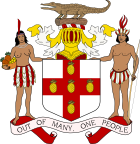
The Caribbean Island of Jamaica was initially inhabited in approximately 600 AD or 650 AD by the Redware people, often associated with redware pottery. By roughly 800 AD, a second wave of inhabitance occurred by the Arawak tribes, including the Tainos, prior to the arrival of Columbus in 1494. Early inhabitants of Jamaica named the land "Xaymaca", meaning "land of wood and water". The Spanish enslaved the Arawak, who were ravaged further by diseases that the Spanish brought with them. Early historians believe that by 1602, the Arawak-speaking Taino tribes were extinct. However, some of the Taino escaped into the forested mountains of the interior, where they mixed with runaway African slaves, and survived free from first Spanish, and then English, rule.

Michael Norman Manley was a Jamaican politician who served as the fourth Prime Minister of Jamaica from 1972 to 1980 and from 1989 to 1992. Manley championed a democratic socialist program, and has been described as a populist. He remains one of Jamaica's most popular prime ministers.

The People's National Party (PNP) is a social-democratic political party in Jamaica, founded in 1938 by Norman Washington Manley who served as party president until his death in 1969. It holds 14 of the 63 seats in the House of Representatives, as 96 of the 227 local government divisions. The party is democratic socialist by constitution.

Percival Noel James Patterson,, popularly known as P.J. Patterson, is a Jamaican former politician who served as the sixth Prime Minister of Jamaica from 1992 to 2006. He served in office for 14 years, making him the longest-serving prime minister in Jamaica's history. He was the leader of the People's National Party from 1992 to 2006.

Sir William Alexander Clarke Bustamante was a Jamaican politician and labour leader, who, in 1962, became the first prime minister of Jamaica.
The Jamaica Labour Party is one of the two major political parties in Jamaica, the other being the People's National Party (PNP). While its name might suggest that it is a social democratic party, the JLP is actually a conservative party.

Edward Philip George Seaga was a Jamaican politician. He was the fifth Prime Minister of Jamaica, from 1980 to 1989, and the leader of the Jamaica Labour Party from 1974 to 2005. He served as leader of the opposition from 1974 to 1980, and again from 1989 until January 2005.

Hugh Lawson Shearer was a Jamaican trade unionist and politician, who served as the 3rd Prime Minister of Jamaica, from 1967 to 1972. He was also Deputy Prime Minister and Minister of Foreign Affairs and Foreign Trade from 1980 to 1989, under Edward Seaga.
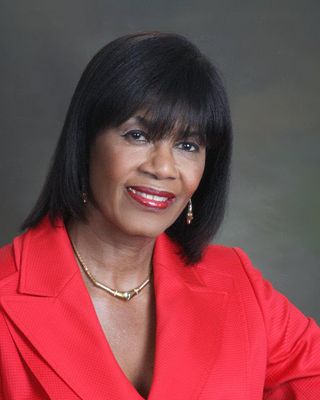
Portia Lucretia Simpson-Miller is a Jamaican former politician. She served as Prime Minister of Jamaica from March 2006 to September 2007 and again from 5 January 2012 to 3 March 2016. She was the leader of the People's National Party from 2005 to 2017 and the Leader of the Opposition twice, from 2007 to 2012 and from 2016 to 2017.

General elections were held in Jamaica on 9 February 1989. The result was a victory for the People's National Party, which won 45 of the 60 seats. Voter turnout was 78%.
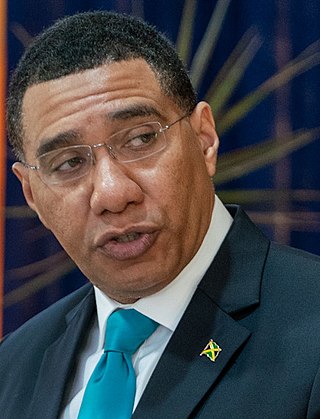
Andrew Michael Holness, is a Jamaican politician, who has been the prime minister of Jamaica since 3 March 2016, following the 2016 Jamaican general election. He is leader of the Jamaica Labour Party (JLP). Holness previously served as prime minister from October 2011 to 5 January 2012. He succeeded Bruce Golding as prime minister, and decided to go to the polls in the 29 December 2011 general election in an attempt to get his own mandate from the Jamaican electorate. He failed in that bid, however, losing to the People's National Party led by Portia Simpson-Miller, with the PNP gaining 42 seats to the JLP's 21. Following that defeat, Holness served as Leader of the Opposition from January 2012 to March 2016, when he once again assumed the position of prime minister. In 2020, the Labour Party won a landslide in another general election, and on 7 September Holness was sworn in for another term as prime minister.
Sharon Hay-Webster is a Jamaican politician. She was a member of the House of Representatives of the Parliament of Jamaica from 1997 to 2012, representing the People's National Party. She came to international attention after the 2004 Haitian coup d'état, when she escorted Jean-Bertrand Aristide from his temporary exile in the Central African Republic to Jamaica at the invitation of then-Prime Minister of Jamaica P. J. Patterson.
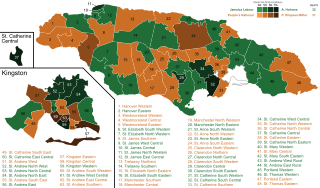
General elections were held in Jamaica on 25 February 2016. The elections were largely a contest between the governing People's National Party (PNP) and the opposition Jamaica Labour Party (JLP). The result was a narrow victory for the JLP, which won 32 of the 63 seats. One political commentator described the poll as "the closest election Jamaica has ever had".

Norman Washington Manley was a Jamaican statesman who served as the first and only Premier of Jamaica. A Rhodes Scholar, Manley became one of Jamaica's leading lawyers in the 1920s. Manley was an advocate of universal suffrage, which was granted by the British colonial government to the colony in 1944.
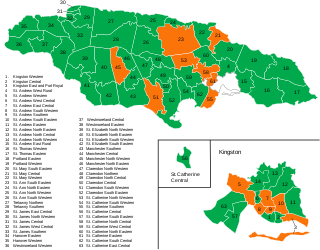
General elections were held in Jamaica on Thursday, 3 September 2020 to elect 63 members of Parliament. As the constitution stipulates a five-year parliamentary term, the next elections were not expected until between 25 February and 10 June 2021. However, Prime Minister Andrew Holness called early elections to ensure a united response to the ongoing COVID-19 pandemic. On the advice of Holness, Governor General Patrick Allen dissolved Parliament on 13 August 2020.

Republicanism in Jamaica is a position which advocates that Jamaica's system of government be changed from a constitutional monarchy to a republic. Both major political parties – the Jamaica Labour Party and the People's National Party – subscribe to the position, and the current Prime Minister of Jamaica, Andrew Holness, has announced that transitioning to a republic will be a priority of his government. In June 2022, the Jamaican government announced its intention that Jamaica become a republic by the time of the next general election in 2025. The process will include a two-thirds majority vote in parliament along with a referendum.
On December 3, 1976, seven armed men raided the residence of reggae musician Bob Marley in Kingston, Jamaica, two days before Marley was to stage a concert in an attempt to quell recent violence. Politicians from across the political spectrum hoped to capitalize on Marley's support. While Marley remained neutral, many viewed him as tacitly supporting the prime minister Michael Manley and his democratic socialist People's National Party (PNP). Marley and three others were shot, but all survived.
The Jamaican political conflict is a long-standing feud between right-wing and left-wing elements in the country, often exploding into violence. The Jamaican Labour Party (JLP) and the People's National Party (PNP) have fought for control of the island for years and the rivalry has encouraged urban warfare in Kingston. Each side believes the other to be controlled by foreign elements; the JLP is said to be backed by the American Central Intelligence Agency (CIA) and the PNP is said to have been backed by the Soviet Union and Cuba.
Ivan Stewart Lloyd was a Jamaican medical practitioner and politician, representing the People's National Party (PNP). He served as Jamaica's first Leader of the Opposition from 1944 to 1949, minister of education and social welfare from 1955 to 1957, minister of home affairs from 1957 to 1959, and was minister of health between 1959 and 1962.

Ralph Eugene Brown OJ, CD was a Jamaican politician who represented the People's National Party (PNP). He served twice as mayor of Kingston from 1974 to 1977 and again from 1986 to 1989. He was Minister of Works (1978–1980), and Minister of Local Government and Community Development (1989–1992).
